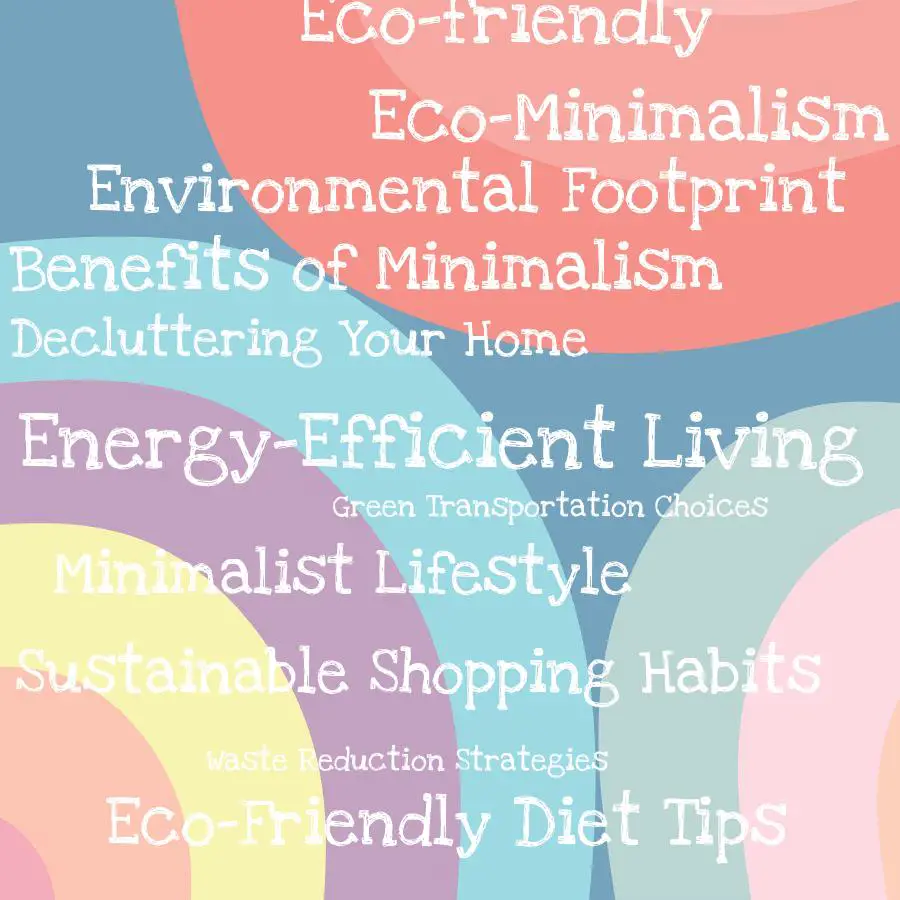Last updated on
In this blog post, we explore how you can reduce your environmental footprint by adopting an eco-friendly minimalist lifestyle.
Have you ever felt overwhelmed by the amount of clutter in your life? Maybe you’ve found yourself drowning in a sea of possessions, struggling to keep your home organized and tidy. I know I have.
But what if I told you that there’s a way to declutter not only your physical space but also your environmental footprint?
As a blogger who writes about decluttering and organizing, I’ve seen firsthand how much stuff we accumulate over time. And as someone who cares deeply about the planet, it’s become increasingly clear to me that our consumerist culture is taking a toll on our environment.
That’s why I’ve decided to embrace an eco-friendly minimalist lifestyle – one that prioritizes reducing waste and living with less.
I’ll be honest – it hasn’t been easy. Letting go of things we think we need can be challenging, especially when society tells us that more is always better.
But as I’ve started downsizing my possessions and simplifying my life, I’ve discovered something remarkable: the less stuff I have, the happier and more fulfilled I feel.
In this blog post, we’ll explore what it means to live an eco-friendly minimalist lifestyle and how you can start reducing your own environmental footprint with less. So come along on this journey with me – let’s discover together how simplicity can lead to greater sustainability for ourselves and for the planet!
Table of Contents
Defining Eco-Minimalism

Before we dive into the practical tips for living an eco-friendly minimalist lifestyle, let’s define what we mean by “eco-minimalism.” At its core, eco-minimalism is about reducing our impact on the environment by consuming less and making more sustainable choices. It’s a way of life that prioritizes simplicity over excess and values experiences over possessions.
For me, embracing an eco-minimalist lifestyle has been a natural extension of my desire to live in harmony with nature. I’ve always loved spending time outdoors and have seen firsthand how human activity can harm ecosystems.
By simplifying my life and reducing my consumption habits, I’m able to minimize my environmental footprint while still enjoying all that nature has to offer.
But it’s not just about protecting the planet – there are personal benefits as well. Living with less stuff means less stress from cluttered spaces or financial burdens from overspending on unnecessary items.
And when you focus on experiences rather than things, you’ll find yourself feeling more fulfilled and content with your life.
So if you’re ready to start living a simpler, more sustainable lifestyle – one that reduces your environmental footprint while also bringing greater joy into your daily routine – then read on for some practical tips!
Benefits of Minimalism
Living a minimalist lifestyle has numerous benefits beyond just reducing your environmental impact. When we have fewer possessions, we tend to feel less stressed and overwhelmed.
We’re able to focus on the things that truly matter in life – our relationships, experiences, and personal growth.
As I began downsizing my possessions and simplifying my life, I found that I had more time for the things that brought me joy. Instead of spending hours cleaning or organizing cluttered spaces in my home, I could spend time with loved ones or pursue hobbies that made me happy.
Minimalism also helps us save money by avoiding unnecessary purchases. By being intentional about what we buy and only purchasing items when necessary (and preferably secondhand), we can reduce our expenses while still living comfortably.
But perhaps most importantly, minimalism allows us to live more sustainably by consuming less resources overall. By reducing waste through conscious consumption habits like composting food scraps or using reusable bags instead of plastic ones at the grocery store – every little bit counts towards making a positive impact on our planet’s health.
In short: embracing an eco-friendly minimalist lifestyle isn’t just good for the environment; it’s good for your mental health too!
Decluttering Your Home
Now that we’ve established the benefits of an eco-friendly minimalist lifestyle, let’s dive into one of the most important aspects: decluttering your home. It can be overwhelming to think about where to start, but trust me – it’s worth it.
When I first began my journey towards minimalism, I was shocked by how much stuff I had accumulated over the years. Clothes that no longer fit or were out of style, kitchen gadgets gathering dust in cabinets and drawers – you name it.
But as I started going through each item and asking myself if it truly brought value to my life, something amazing happened: a weight lifted off my shoulders. Decluttering not only frees up physical space in your home but also mental space in your mind.
You’ll find yourself feeling less stressed and more focused on what really matters when you’re not constantly surrounded by clutter. But what do you do with all those items once you’ve decided they no longer serve a purpose? One option is to donate them to charity or sell them online for some extra cash.
Another option is recycling or repurposing items whenever possible instead of throwing them away. By decluttering our homes and being mindful about what we bring into our lives moving forward, we can reduce waste while creating a more peaceful living environment for ourselves at the same time.
So take that first step today – grab a trash bag or donation box and start letting go of anything weighing you down!
Sustainable Shopping Habits
One of the most significant ways we can reduce our environmental footprint is by changing our shopping habits. As a minimalist, I’ve learned to be more intentional about what I buy and where it comes from.
Instead of mindlessly consuming, I now prioritize sustainable and ethical products that align with my values.
For example, when shopping for clothes, I look for brands that use eco-friendly materials like organic cotton or recycled polyester. And instead of buying fast fashion pieces that will fall apart after a few wears, investing in high-quality items means they’ll last longer and won’t need to be replaced as often.
But sustainable shopping isn’t just limited to clothing – it applies to everything we purchase. When grocery shopping, choosing locally sourced produce reduces transportation emissions while supporting local farmers.
Opting for package-free options also cuts down on unnecessary waste.
By being mindful about what we buy and where it comes from, we can make small but impactful changes towards living an eco-friendly minimalist lifestyle – one that prioritizes reducing waste while still enjoying the things we love in life!
Green Transportation Choices
One of the most significant ways we can reduce our environmental footprint is by making conscious choices about how we get around. As a minimalist, I’ve found that owning a car isn’t always necessary – in fact, it can be quite burdensome.
Not only do cars require maintenance and fuel, but they also contribute to air pollution and greenhouse gas emissions. That’s why I’ve started exploring alternative transportation options like biking or walking for shorter distances or taking public transit when possible.
These green transportation choices not only benefit the environment but also have added health benefits for me personally. Of course, there are times when having access to a car is necessary – maybe you live in an area without reliable public transit or need to transport large items regularly.
In those cases, consider investing in an electric vehicle (EV) instead of traditional gasoline-powered cars. By choosing eco-friendly modes of transportation whenever possible and opting for EVs over gas-guzzling vehicles when needed, we can significantly reduce our carbon footprint while still maintaining mobility and convenience in our daily lives.
Energy-Efficient Living
One of the most significant ways to reduce your environmental footprint is by adopting an energy-efficient lifestyle. As a minimalist, you’re already on the right track – after all, using less energy means consuming fewer resources and reducing waste.
But there are still plenty of steps you can take to make your home even more eco-friendly.
For starters, consider investing in LED light bulbs instead of traditional incandescent ones. Not only do they use significantly less electricity (up to 80%!), but they also last much longer than their counterparts.
Another way to save energy is by unplugging electronics when not in use or utilizing power strips that allow for easy shut-off at night or during extended periods away from home.
If possible invest in renewable sources such as solar panels which will help reduce reliance on non-renewable sources like coal and oil while saving money over time through reduced utility bills. By making these small changes towards an eco-friendly minimalist lifestyle we can create a better future for ourselves and our planet!
Waste Reduction Strategies
One of the most significant benefits of adopting an eco-friendly minimalist lifestyle is waste reduction. When we consume less, we produce less waste, which means fewer resources are needed to manage our trash.
But how can you reduce your waste in practical ways?
One strategy is to focus on reducing single-use items like plastic bags and water bottles. Instead, invest in reusable alternatives that will last longer and save you money over time.
Another approach is to buy products with minimal packaging or opt for package-free options when possible. This not only reduces the amount of trash you generate but also sends a message to companies that consumers care about sustainable practices.
Consider composting food scraps instead of throwing them away. Composting turns organic matter into nutrient-rich soil that can be used for gardening or landscaping projects.
By implementing these strategies (and others), I’ve been able to significantly reduce my household’s waste output while still enjoying all the things I love about life – from cooking delicious meals at home to traveling and exploring new places. Living an eco-friendly minimalist lifestyle isn’t just good for the planet; it’s also good for your mental health and well-being! By simplifying your possessions and focusing on what truly matters in life, you’ll find yourself feeling more contented than ever before – all while doing your part towards creating a healthier world for future generations!
Eco-Friendly Diet Tips
1. Eat plant-based meals: Animal agriculture is one of the leading causes of greenhouse gas emissions, so reducing or eliminating meat from your diet can have a significant impact on the environment.
2. Buy local and seasonal produce: Choosing fruits and vegetables that are grown locally reduces transportation emissions while supporting local farmers.
3. Reduce food waste: Approximately one-third of all food produced globally goes to waste, contributing to greenhouse gas emissions in landfills.
Plan meals ahead, freeze leftovers for later use or compost scraps instead.
4.Choose reusable containers over single-use packaging when shopping for groceries
By adopting these simple habits into our daily lives we can make small changes with big impacts on our planet’s health!




